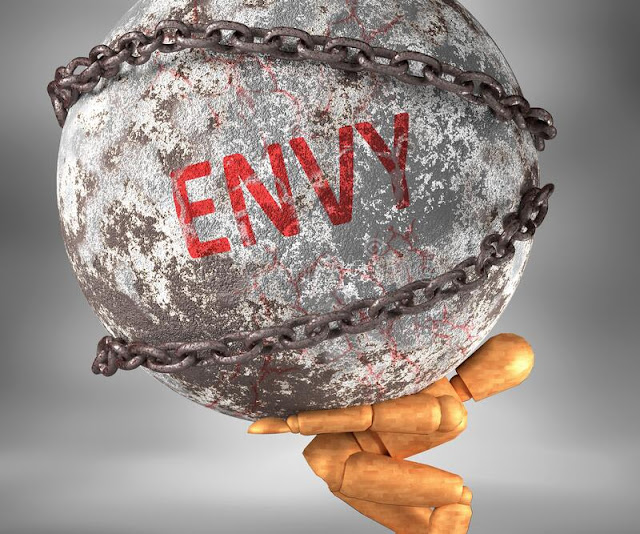As We Think : Philosophy of Envy - When we give up our own values and then fill the emptiness with envy
Envy is encouraged and respected, is it not? The competitive spirit is nourished from childhood. The idea that you must do and be better than another is repeated constantly in different ways; the example of success, the hero, and his brave act, are endlessly dinned into the mind. The present culture is based on envy, on acquisitiveness. If you are not acquisitive of worldly things and instead follow some religious teacher, you are promised the right place in the hereafter. We are all brought up on this, and the desire to succeed is deeply embedded in almost everyone. Success is pursued in different ways success as an artist, as a businessman, as a religious aspirant. All this is a form of envy, but it is only when envy becomes distressing, painful, that one attempts to get rid of it. Krishnamurti - Series II - Chapter 53
Envy is an emotion that occurs when a person lacks
another´s superior quality, achievement, or possession and either desire it or
wishes that the other lacked it. Envy is essentially a response to perceived
inferiority. Such inferiority can be overcome either by bringing oneself up to
the level of the envied or by pulling them down to one’s level.
Aristotle defined envy as pain at the sight of another´s
good fortune, stirred by those who have what we ought to have.
Bertrand Russel said that envy was one of the most potent
causes of unhappiness. Not only is the envious person rendered unhappy by his
or her envy, Russel explained, but that person may also wish to inflict
misfortune on others, in the forms of emotional abuse and violent acts of criminality.
Shadenfreude means taking pleasure in the misfortune of
others and can be understood as an outgrowth of envy in certain situations.
Schadenfreude is the experience of pleasure, joy, or
self-satisfaction that comes from learning of or witnessing the troubles,
failures, or humiliation of another.
Envy and Shadenfreude are very similar and are linked to emotional
states. Both emotions are considered very complex and oftentimes looked down
upon, which is understandable considering they are both antisocial behaviours.
˝ Prerequisite for becoming envious is to give up your own values.
Envious people give up their own values and then fill this
emptiness with envy.
Sometimes people that were traumatized and underestimated
give up their own values, develop low self-esteem with a strong inferiority
complex, and then finally start to envy others who did not give up their own
values.
Envy is a very powerful core of negativity and can cause
clusters of negative emotions and thoughts to accumulate in an envious
individual.
The four kinds of envy
Emulative envy stems from being primarily concerned with getting good for oneself and perceiving oneself as capable of doing so; the typical behavioural tendency is self-improvement.
Inert envy is the sterile version of emulative envy: the envier wants to get the good for oneself but doesn’t think that they can do so; the typical behavioural tendency is self-loathing, wallowing in one’s misery, and avoidance of the envied.
Aggressive envy derives from being primarily concerned with the envied’s possession of the good, rather than the good itself, and perceiving oneself as capable of taking the good away from the envied; the typical behavioural tendency is thus sabotaging and stealing the envied object.
Spiteful envy is a less productive version of aggressive envy: the envier wants to take the good from the envied but doesn’t think that they can do so; the typical behavioural tendency is spoiling the good. Sara Protasi - Philosophy of envy
The great illusion of envy is that the misfortune of others
will make the envious individual feel better. This feeling of false
happiness (Shadenfreude) is nothing but an explosion of malice. Envy is a trap for
the envy individual and stops personal development. Envy is the killer of
positive emotions and thoughts. Domina Petric, MD -
As We Think - Greatest thoughts



Comments
Post a Comment